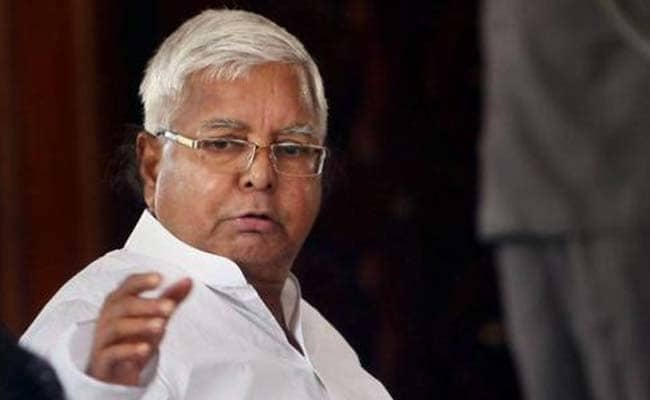Lalu Prasad Yadav was convicted in three cases pertaining to the Fodder Scam that took place in the 1990s. He was convicted along with fifteen others in December 2017.

New Delhi: The Supreme Court today refused to grant bail to Rashtriya Janata Dal chief Lalu Prasad Yadav in the Fodder Scam cases he has been convicted in.
A Bench of Chief Justice of India Ranjan Gogoi and Justices Deepak Gupta and Sanjiv Khanna refused to interfere with the order of Jharkhand High Court which had rejected Yadav’s plea.
Senior Advocate Kapil Sibal along with advocate Adit Pujari appeared for Lalu Prasad Yadav.
Sibal said Yadav was given a 14-year sentence and not 25 years, and he is not “running away”.
To this, Chief Justice of India Ranjan Gogoi replied, “Whether it is 25 years or 14, the High Court will decide. We can ask the High Court to expedite the cases against politicians.” The Court told Lalu Yadav he has so far served only 24 months against his 25-year conviction.
Sibal asked what could be the danger if Yadav was released on bail, to which the court replied, “There is no danger, except you are convicted. We don’t think we can grant bail. Petition dismissed.”
The Court then dismissed the case.
Lalu Prasad Yadav was convicted in three cases pertaining to the Fodder Scam that took place in the 1990s. He was convicted along with fifteen others in December 2017.
Then, in March 2018, a Special CBI Court sentenced Yadav to seven years imprisonment for his role in the fraudulent transfer of money to the tune of Rs. 3.76 crores from the Dumka Treasury between 1989 and 1995, during which time Yadav had served as the Chief Minister and Finance Minister.
The Jharkhand High Court rejected Yadav’s bail plea in January this year, following which Yadav challenged this decision before the Supreme Court.
Yadav, who has been in the hospital for about eight months now had sought bail on medical grounds. However, the Central Bureau of Investigation (CBI) had flagged the possibility of Yadav misusing medical grounds to secure a bail order and using his release for political purposes.
It added that the former Bihar chief minister “is conducting political activities from a special ward of a hospital.”
“For the first time since 1977 when Lalu Yadav contested his first elections and became a parliamentarian from Saran, he won’t be campaigning this time. He also didn’t contest the 2014 national election and in 2015 he was barred from fighting any election after conviction in another fodder scam case,” NDTV reported.
“Lalu Prasad Yadav was convicted in 2017 in yet another fodder scam case and has been at a hospital in Ranchi for much of his sentence so far. He was held guilty of a multi-million-rupee scam involving the embezzlement of government funds meant for cattle fodder in the 1990s when he was chief minister of undivided Bihar,” the report added.
Last year, he was granted six weeks’ provisional bail. He was restrained from taking part in any public function or political activity and was also barred from interacting with the media during that time.
Later, he asked for another break from prison on health grounds, claiming he needed surgery. A Jharkhand court refused and ordered him back to jail.
CBI said Yadav is facing bail in a case in which he has been sentenced to 14 years in prison. He has not spent even 15% of the time in jail. In fact, the chargesheet against Yadav, in this case, was filed in the year 2000. It had taken 18 years for the trial to conclude.
Grant of bail in economic fraud cases is an exceptional remedy, the agency pointed out.
Yadav was Bihar’s Chief Minister and custodian of the public administration when he committed the crime.
“The present case involves a deep-rooted conspiracy and involved huge loss and defection and misappropriation of public funds affecting the economy of the country,” the agency submitted.
It said the fodder scam involves the fraudulent withdrawal of public money to the tune of ₹950 crore in the early 1990s. Of a total 64 fodder scam cases investigated by the CBI, chargesheets could be filed in 60 cases. The remaining four cases were closed.
Of these 60 cases, 53 were tried at Ranchi. Fifty-one of these cases have ended in conviction.